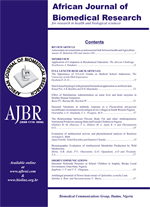
|
African Journal of Biomedical Research
Ibadan Biomedical Communications Group
ISSN: 1119-5096
Vol. 18, No. 2, 2015, pp. 147-160
|
 Bioline Code: md15017
Bioline Code: md15017
Full paper language: English
Document type: Research Article
Document available free of charge
|
|
|
African Journal of Biomedical Research, Vol. 18, No. 2, 2015, pp. 147-160
| en |
Outcome of Training Intervention on Teachers’ Knowledge, Perception and Self-Efficacy for Preventing Childhood Lead Poisoning in Ido Local Government Area, Ibadan Nigeria
Karunwi, A.O. & Oshiname, F.
Abstract
Exposure of school children to lead from various sources, including the school environment, is perilous to their health. In this study, teachers’ knowledge of Lead Poisoning (LP) was assessed and the effects of training on their knowledge, perceptions and self-efficacy for preventing childhood LP in Ido Local Government Area (LGA), Oyo state was determined. The quasi- experimental study involved an Experimental Group (EG) of 27 teachers nominated by 15 purposively selected schools in Ido LGA and a Control Group (CG) of 30 teachers from 15 schools in Egbeda LGA. The two groups completed a pre -test using a validated questionnaire and the results were used to design a 4-day Training Intervention for the EG. A post-test was conducted among the two groups using the same questionnaire. Data were analyzed using descriptive, Chi-square, ANOVA and t-test statistics. The EG and CG Mean Knowledge (MK) scores at pre-test using a 74-point knowledge scale were 20.2±16.3 and 14.6±14.4 respectively. Mean scores at post-test for the EG and CG were 71.8±3.1 and 19.2±17.8 respectively (p<0.05). A significant difference was found between the EG’s pre-test (20.2±16.3) and post-test (71.8±3.1) scores (p<0.05). The control’s mean pre-test and post-test knowledge scores of 14.6±14.4 and 19.2±17.8 respectively were not significantly different. Perception of the EG that LP is more serious in children than adults changed from 5% at pre-test to 100% at post-test (p<0.05), while for the control perceptions were 13.3% and 23.3% for pre-test and post-test respectively with no significant difference. The EG participant’s self-efficacy relating to level of confidence in advocating for school-based LP control rose significantly from 29% at pre-test to 100% at post-test (p<0.05); values among the control at pre-test and post-test were 26.7% and 23.3% respectively (p>0.05). Training intervention was effective in improving teachers’ knowledge and influenced their perception and self-efficacy relating to the control of LP. Teachers can be used to upgrade their peers’ knowledge.
Keywords
Childhood lead poisoning; Primary school teachers; Training intervention; Perception
|
| |
© Copyright 2015 - African Journal of Biomedical Research
|
|
